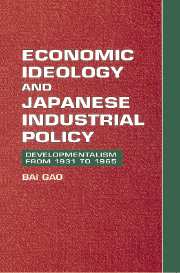Book contents
- Frontmatter
- Contents
- Acknowledgments
- List of abbreviations
- Note on Japanese usage
- 1 Introduction
- 2 The Ideology of Japanese developmentalism
- 3 The managed economy
- 4 Priority production
- 5 Promoting exports
- 6 High growth and liberalization
- 7 The institutional environment of economic reasoning
- Epilogue: Japanese developmentalism in historical perspective
- References in English
- References in Japanese
- Index
1 - Introduction
Published online by Cambridge University Press: 29 March 2010
- Frontmatter
- Contents
- Acknowledgments
- List of abbreviations
- Note on Japanese usage
- 1 Introduction
- 2 The Ideology of Japanese developmentalism
- 3 The managed economy
- 4 Priority production
- 5 Promoting exports
- 6 High growth and liberalization
- 7 The institutional environment of economic reasoning
- Epilogue: Japanese developmentalism in historical perspective
- References in English
- References in Japanese
- Index
Summary
It has been a half-century since the end of World War II, the war that changed the course of modern history. How did this war affect our present life? This question was repeatedly raised and answered in Japan during the war's 50th anniversary. “With regard to the Japanese economy,” writes economist Noguchi Yukio (1995), “the war never ended.” Even today, after 50 years, the Japanese economy still operates, both institutionally and ideologically, by the “1940 system,” a wartime establishment that was alien (ishitsu) to prewar Japan. This system, which overemphasizes production while rejecting competition, has resulted in “institutional exhaustion” – a major symptom of the “Japanese disease” that has made the nation's economy crumble. Senior bureaucrat Sakakibara Eisuke (1995) disagrees, however. He argues that present-day Japanese capitalism should be regarded not as alien but as parallel to developments in Europe and the United States – one of the three distinctive patterns of modern capitalism that evolved from a great transformation in the period between the late 1920s and the early 1950s. After World War I, the Communist Revolution, as exemplified in the Soviet Union, was not the only alternative to traditional capitalism. Capitalism in all major industrialized countries transcended the stage of laissez-faire and entered a new era of state intervention. From this process emerged democratic socialism, practiced in France and Britain; state socialism, practiced in Germany, Italy, and Japan; and the New Deal, practiced in the United States. Today's economic institutions in these countries still reflect the transformation that occurred decades ago. For this reason, says Sakakibara, one cannot judge whether Japanese capitalism is alien according to neoclassical assertions such as “consumer rights” or “perfect competition.”
- Type
- Chapter
- Information
- Economic Ideology and Japanese Industrial PolicyDevelopmentalism from 1931 to 1965, pp. 1 - 17Publisher: Cambridge University PressPrint publication year: 1997
- 1
- Cited by



